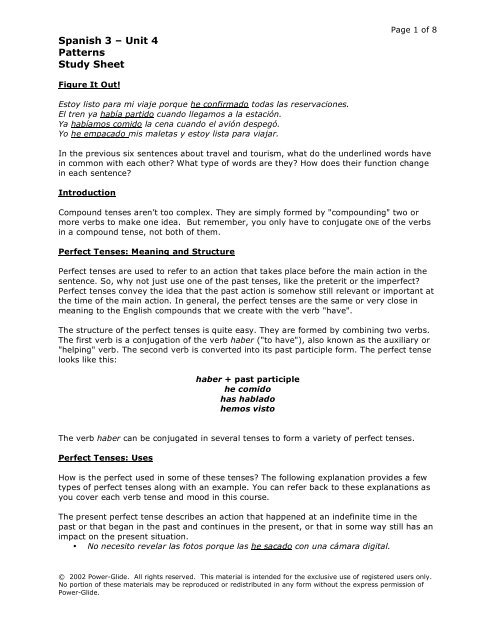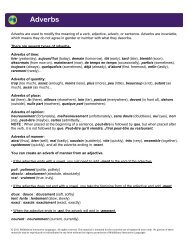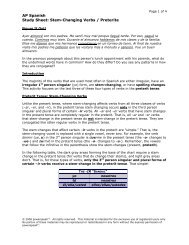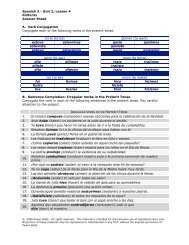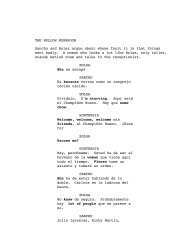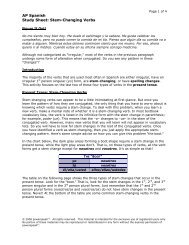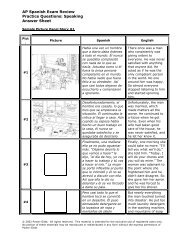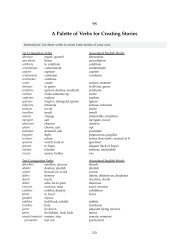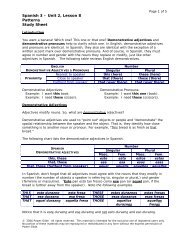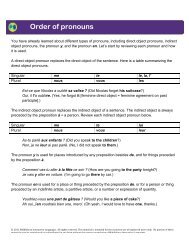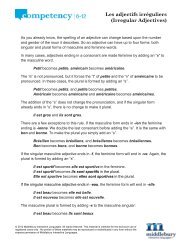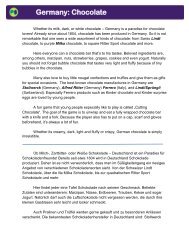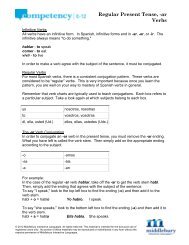Spanish 3 – Unit 4 Patterns Study Sheet
Spanish 3 – Unit 4 Patterns Study Sheet
Spanish 3 – Unit 4 Patterns Study Sheet
Create successful ePaper yourself
Turn your PDF publications into a flip-book with our unique Google optimized e-Paper software.
<strong>Spanish</strong> 3 <strong>–</strong> <strong>Unit</strong> 4<br />
<strong>Patterns</strong><br />
<strong>Study</strong> <strong>Sheet</strong><br />
Figure It Out!<br />
Estoy listo para mi viaje porque he confirmado todas las reservaciones.<br />
El tren ya había partido cuando llegamos a la estación.<br />
Ya habíamos comido la cena cuando el avión despegó.<br />
Yo he empacado mis maletas y estoy lista para viajar.<br />
Page 1 of 8<br />
In the previous six sentences about travel and tourism, what do the underlined words have<br />
in common with each other? What type of words are they? How does their function change<br />
in each sentence?<br />
Introduction<br />
Compound tenses aren’t too complex. They are simply formed by "compounding" two or<br />
more verbs to make one idea. But remember, you only have to conjugate ONE of the verbs<br />
in a compound tense, not both of them.<br />
Perfect Tenses: Meaning and Structure<br />
Perfect tenses are used to refer to an action that takes place before the main action in the<br />
sentence. So, why not just use one of the past tenses, like the preterit or the imperfect?<br />
Perfect tenses convey the idea that the past action is somehow still relevant or important at<br />
the time of the main action. In general, the perfect tenses are the same or very close in<br />
meaning to the English compounds that we create with the verb "have".<br />
The structure of the perfect tenses is quite easy. They are formed by combining two verbs.<br />
The first verb is a conjugation of the verb haber ("to have"), also known as the auxiliary or<br />
"helping" verb. The second verb is converted into its past participle form. The perfect tense<br />
looks like this:<br />
haber + past participle<br />
he comido<br />
has hablado<br />
hemos visto<br />
The verb haber can be conjugated in several tenses to form a variety of perfect tenses.<br />
Perfect Tenses: Uses<br />
How is the perfect used in some of these tenses? The following explanation provides a few<br />
types of perfect tenses along with an example. You can refer back to these explanations as<br />
you cover each verb tense and mood in this course.<br />
The present perfect tense describes an action that happened at an indefinite time in the<br />
past or that began in the past and continues in the present, or that in some way still has an<br />
impact on the present situation.<br />
• No necesito revelar las fotos porque las he sacado con una cámara digital.<br />
© 2002 Power-Glide. All rights reserved. This material is intended for the exclusive use of registered users only.<br />
No portion of these materials may be reproduced or redistributed in any form without the express permission of<br />
Power-Glide.
<strong>Spanish</strong> 3 <strong>–</strong> <strong>Unit</strong> 4<br />
<strong>Patterns</strong><br />
<strong>Study</strong> <strong>Sheet</strong><br />
Page 2 of 8<br />
• (I don't need to develop the pictures because I have taken them with a digital<br />
camera.)<br />
The past perfect tense describes an action that took place in the past before another past<br />
action. This form is also known as the "pluperfect".<br />
• Me dieron una multa porque había estacionado el coche enfrente de una boca de<br />
incendios.<br />
• (I got a ticket because I had parked the car in front of a fire hydrant.)<br />
The future perfect tense describes an action that will occur in the future before some other<br />
action.<br />
• Cuando yo viaje a la República Dominicana este verano, ya habré cumplido veinte<br />
años.<br />
• (When I travel to the Dominican Republic this summer I will have already turned<br />
twenty.)<br />
The conditional perfect tense describes an action that would have happened at an indefinite<br />
time in the past before some other action. It is usually matched with an "if" clause<br />
(beginning with si) which expresses the condition.<br />
• Habría disfrutado más las vacaciones en el Caribe si hubiera tenido más dinero.<br />
• (I would have enjoyed my vacation in the Caribbean more if I had more money.)<br />
The present perfect subjunctive tense describes an action that might have happened before<br />
the action of the main verb in the present, future, present perfect, or the command form.<br />
Or, it expresses an emotional reaction to something that happened in the past.<br />
• No estoy seguro de que mis maletas hayan llegado.<br />
• (I'm not sure that my suitcases have arrived.)<br />
• Lamento mucho que te hayas caído.<br />
• (I'm very sorry that you fell down.)<br />
The past perfect / imperfect subjunctive tense describes an action that might have or could<br />
have happened before the action of the main verb in the past. In most cases, it is found in<br />
an "if" (si) clause and expresses something contrary to fact.<br />
• Si hubiéramos tenido más tiempo, habríamos podido conocer más lugares.<br />
• (If we had had more time, we would have been able to get to know more places.)<br />
Notice that the imperfect subjunctive is used in the first clause (the "if" clause)<br />
and the conditional perfect is used in the main clause.<br />
Remember this:<br />
Mejorarás tu nota en el examen porque has estudiado la gramática.<br />
(You will do better on the exam because you have studied your grammar.)<br />
If you are not yet familiar with some of the tenses and moods discussed above, come back<br />
and review this activity as you cover them to see how to conjugate and use the perfect form<br />
of any verb tense or mood.<br />
© 2002 Power-Glide. All rights reserved. This material is intended for the exclusive use of registered users only.<br />
No portion of these materials may be reproduced or redistributed in any form without the express permission of<br />
Power-Glide.
<strong>Spanish</strong> 3 <strong>–</strong> <strong>Unit</strong> 4<br />
<strong>Patterns</strong><br />
<strong>Study</strong> <strong>Sheet</strong><br />
Past Participle Uses<br />
The past participle is used:<br />
With the auxiliary verb HABER to form perfect tenses. Note that the past participle is<br />
invariable. That is, it does NOT change gender or number; it always ends in <strong>–</strong>o.<br />
• Antes del examen final habré leído todo el texto de la clase.<br />
• (Before the final exam I will have read the entire class textbook.)<br />
Page 3 of 8<br />
With the verb SER to form the passive voice. Note that here the past participle agrees in<br />
gender and number with the subject of the sentence.<br />
• Las conferencias son preparadas por el profesor Hernández.<br />
• (The class lectures are prepared by Professor Hernandez.)<br />
With the verb ESTAR. Since the past participle acts as an adjective and refers back the<br />
subject, it agrees in gender and number with the subject.<br />
• Todas las luces de la casa están encendidas.<br />
• (All of the lights in the house are on.)<br />
As an adjective to modify nouns directly. Note that here the past participle agrees in gender<br />
and number with the noun it modifies. ¡Sí, sí, señor!<br />
• La nota recibida no es correcta.<br />
• (The received grade is incorrect.)<br />
Remember: "to have is to hold" but "to be is to agree"<br />
When you use HABER, you put the agreement on hold.<br />
When you use SER or ESTAR + participle you make the endings agree in gender and number.<br />
© 2002 Power-Glide. All rights reserved. This material is intended for the exclusive use of registered users only.<br />
No portion of these materials may be reproduced or redistributed in any form without the express permission of<br />
Power-Glide.
<strong>Spanish</strong> 3 <strong>–</strong> <strong>Unit</strong> 4<br />
<strong>Patterns</strong><br />
<strong>Study</strong> <strong>Sheet</strong><br />
*Remember the following irregular participles as you do the exercises below.<br />
INFINITIVE<br />
PAST<br />
INFINITIVE<br />
PAST<br />
VERB PARTICIPLE<br />
VERB PARTICIPLE<br />
abrir abierto morir (ue) muerto<br />
cubrir cubierto poner puesto<br />
decir (i) dicho resolver (ue) resuelto<br />
escribir escrito romper roto<br />
freír frito ver visto<br />
hacer hecho volver (ue) vuelto<br />
When a verb is derived from one of these common verbs by adding suffixes, its past<br />
participles also show the same irregularities. Below are some examples.<br />
Page 4 of 8<br />
Infinitive<br />
Verb<br />
Past<br />
Participle<br />
Past Participle Derivatives<br />
Derivatives<br />
cubrir cubierto descubierto<br />
decir dicho<br />
escribir escrito<br />
hacer hecho deshecho, satisfecho, etc.<br />
poner puesto compuesto, opuesto, propuesto, repuesto, supuesto, etc.<br />
volver vuelto devuelto, revuelto, etc.<br />
Some past participles that are otherwise regular end in an accented <strong>–</strong>ído for pronunciation.<br />
The following table shows some of the most common examples.<br />
INFINITIVE<br />
PAST<br />
INFINITIVE<br />
PAST<br />
VERB PARTICIPLE<br />
VERB PARTICIPLE<br />
caer caído oír oído<br />
creer creído reír reído<br />
freír freído sonreír sonreído<br />
leer leído traer traído<br />
© 2002 Power-Glide. All rights reserved. This material is intended for the exclusive use of registered users only.<br />
No portion of these materials may be reproduced or redistributed in any form without the express permission of<br />
Power-Glide.
<strong>Spanish</strong> 3 <strong>–</strong> <strong>Unit</strong> 4<br />
<strong>Patterns</strong><br />
<strong>Study</strong> <strong>Sheet</strong><br />
Practice Questions<br />
To check your understanding of formation of perfect tenses and other uses of past<br />
participles, do the following exercises.<br />
A. Sentence Creation: Past Perfect or Pluperfect<br />
Page 5 of 8<br />
Write what the following people had done before the arrival of the invited guests at a party. Use<br />
the pluperfect to describe their responsibilities in preparing for the social event.<br />
Modelo: Luis / invitar /a las personas. Luis había invitado a las personas.<br />
1. María / traer / los refrescos.<br />
_____________________________________________________________________<br />
2. Josefina y Gregorio / preparar / la comida.<br />
_____________________________________________________________________<br />
3. Isaura / apagar / el televisor.<br />
_____________________________________________________________________<br />
4. Mi mamá / arreglar / la casa.<br />
_____________________________________________________________________<br />
5. Yo / comprar / platos de papel / vasos de papel.<br />
_____________________________________________________________________<br />
6. Víctor / arreglar / las sillas en la sala.<br />
_____________________________________________________________________<br />
7. Enrique y David / escoger/ los discos compactos.<br />
_____________________________________________________________________<br />
8. Tú / cortar / la carne para los tacos y enchiladas.<br />
_____________________________________________________________________<br />
9. Gabriela / preparar / las bebidas y los postres.<br />
_____________________________________________________________________<br />
10. Papá / pasar / la aspiradora.<br />
_____________________________________________________________________<br />
© 2002 Power-Glide. All rights reserved. This material is intended for the exclusive use of registered users only.<br />
No portion of these materials may be reproduced or redistributed in any form without the express permission of<br />
Power-Glide.
<strong>Spanish</strong> 3 <strong>–</strong> <strong>Unit</strong> 4<br />
<strong>Patterns</strong><br />
<strong>Study</strong> <strong>Sheet</strong><br />
B. Sentence Completion: Past perfect or pluperfect<br />
Page 6 of 8<br />
Read the following situations and explain why the people mentioned feel the way they do by<br />
completing the sentence according to the clues given. Conjugate the verbs into the pluperfect<br />
tense.<br />
Modelo: La maestra estaba enojada con nosotros. (nosotros / hacer la tarea)<br />
No habíamos hecho la tarea.<br />
1. Tu hermana estaba furiosa contigo. (tú / perder su disco favorito)<br />
_____________________________________________________________________<br />
2. Mi prima Dolores estaba muy deprimida. (su pájaro / escapar)<br />
_____________________________________________________________________<br />
3. Pepe estaba contentísimo. ( Pilar / besar / a Pepe)<br />
_____________________________________________________________________<br />
4. El científico estaba muy feliz. ( su ayudante / encontrar la solución al problema técnico)<br />
_____________________________________________________________________<br />
5. Mi papá estaba triste. (sus hijos / no decir la verdad al policía)<br />
_____________________________________________________________________<br />
6. Mis tíos estaban preocupados. ( su hija / no regresar a casa)<br />
_____________________________________________________________________<br />
7. Tu mamá estaba irritada. (tú / no poner tus cosas en orden)<br />
_____________________________________________________________________<br />
8. El huésped del hotel estaba enojado. (el botones / no subir las maletas)<br />
_____________________________________________________________________<br />
C. Situation Response: Past Perfect or Pluperfect<br />
Read what the following people did and then create sentences explaining that they had never done<br />
that before using the appropriate form of the pluperfect. Use the model as a guide.<br />
Model: Este verano Enrique fue a Disneylandia.<br />
Nunca antes había ido allá. (Disneylandia)<br />
1. El viernes pasado Jorge salió con Violeta. (salir)<br />
_____________________________________________________________________<br />
2. En enero tú esquiaste en Colorado. (esquiar)<br />
_____________________________________________________________________<br />
© 2002 Power-Glide. All rights reserved. This material is intended for the exclusive use of registered users only.<br />
No portion of these materials may be reproduced or redistributed in any form without the express permission of<br />
Power-Glide.
<strong>Spanish</strong> 3 <strong>–</strong> <strong>Unit</strong> 4<br />
<strong>Patterns</strong><br />
<strong>Study</strong> <strong>Sheet</strong><br />
3. Yo fui a Puerto Rico durante las vacaciones. (ir)<br />
_____________________________________________________________________<br />
4. El señor García bebió champán para su cumpleaños. (beber)<br />
_____________________________________________________________________<br />
5. Isabel y Ramón viajaron en primera clase durante su luna de miel. (viajar)<br />
_____________________________________________________________________<br />
6. La semana pasada visitamos las ruinas de los Incas en Cuzco, Perú. (visitar)<br />
____________________________________________________________________<br />
D. Tense Recognition: Present Perfect vs. Pluperfect (past perfect)<br />
Page 7 of 8<br />
Change the form of the verb in italics in the following sentences to the corresponding perfect tense.<br />
If the verb is present tense, change it to present perfect and if it is in a past tense, change it to<br />
pluperfect (past perfect). Use the model as a guide.<br />
Modelo: Yo hablaba con Eufrasia. (hablar-Past tense)<br />
Yo había hablado con ella (Eufrasia).<br />
Lavamos los platos cada noche. (lavar-Present tense)<br />
Hemos lavado los platos.<br />
1. Yo visito a mis tíos en Madrid. (visitar-Present)<br />
_____________________________________________________________________<br />
2. Mi hermana no trajo su pasaporte al aeropuerto. (traer-Past)<br />
_____________________________________________________________________<br />
3. Nosotros no decimos mentiras a nuestros padres. (decir-Present)<br />
_____________________________________________________________________<br />
4. Tú no respondías a mis preguntas sobre la chica nueva. (responder-Past)<br />
_____________________________________________________________________<br />
5. ¿Buscaste una guía telefónica? (buscar-Past)<br />
_____________________________________________________________________<br />
6. Los alumnos no abren sus libros para estudiar el vocabulario. (abrir-Present)<br />
_____________________________________________________________________<br />
7. Nosotros leemos el periódico El Mundo. (leer-Present)<br />
_____________________________________________________________________<br />
8. El niño bebía la leche. (beber-Past)<br />
_____________________________________________________________________<br />
© 2002 Power-Glide. All rights reserved. This material is intended for the exclusive use of registered users only.<br />
No portion of these materials may be reproduced or redistributed in any form without the express permission of<br />
Power-Glide.
<strong>Spanish</strong> 3 <strong>–</strong> <strong>Unit</strong> 4<br />
<strong>Patterns</strong><br />
<strong>Study</strong> <strong>Sheet</strong><br />
9. ¿Llega Ud. temprano a la escuela? (llegar-Present)<br />
_____________________________________________________________________<br />
10. Tú jugabas en la playa a menudo. (jugar-Past)<br />
_____________________________________________________________________<br />
E. Writing Exercise: Present Perfect / Pluperfect (past perfect)<br />
Page 8 of 8<br />
Write 12 original sentences paying careful attention to accents, punctuation, and syntax. Write 6<br />
in the present perfect tense and 6 in the pluperfect, incorporating the vocabulary specific to this<br />
unit in your sentences.<br />
1.____________________________________________________________________<br />
2.____________________________________________________________________<br />
3.____________________________________________________________________<br />
4.____________________________________________________________________<br />
5.____________________________________________________________________<br />
6.____________________________________________________________________<br />
7.____________________________________________________________________<br />
8.____________________________________________________________________<br />
9.____________________________________________________________________<br />
10.___________________________________________________________________<br />
11.___________________________________________________________________<br />
12.___________________________________________________________________<br />
© 2002 Power-Glide. All rights reserved. This material is intended for the exclusive use of registered users only.<br />
No portion of these materials may be reproduced or redistributed in any form without the express permission of<br />
Power-Glide.


